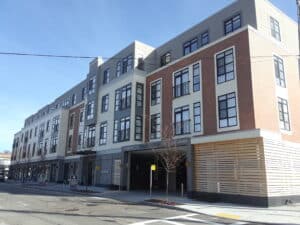
The 28 Austin project was the first new multifamily project built north of Route 9 in Newton in over a decade. Photo courtesy of Oaktree Development
When 28 Austin, a mixed-use development that transformed an underutilized municipal parking lot into 68 apartments and 5,000 square feet of retail, opened in fall 2019 it was the culmination of two distinct innovative housing strategies.
The first was the deployment of a still evolving technology, off-site modular construction. The second was unleashing the power of committed community engagement to break down traditional barriers to building affordable housing in Boston suburbs.
Developed by Austin Street Partners, a joint venture between Dinosaur Capital and Oaktree Development with the support of the city of Newton, 28 Austin was seven years in the making, and marks the first new multifamily housing north of Route 9 in Newton in over a decade. It also provides 23 affordable units (with five of those reserved for Section 8 renters) in a city that is woefully deficient in affordable housing.
Modular Has Come a Long Way
Although modular construction is not new, technological advances like building information modeling have greatly improved the delivery process and quality of construction. Continued Innovation, like Oaktree Development’s GreenStaxx modular building technology, which uses a virtual library of multiple pre-designed and pre-engineered units that can be assembled like Lego blocks to fit any site, make modular increasingly viable.
A 2019 McKinsey report estimates that modular construction can potentially cut schedules by 20 percent to 50 percent and construction costs by 20 percent when standardized designs and production are implemented, leading many to conclude that modular is the future of affordable housing production.
For 28 Austin, the 65-by-13-foot units were built in a climate-controlled factory in Canada, transported by flatbed truck, then assembled at Austin Street in just over two weeks. Oaktree has constructed a number of multifamily modular projects in Massachusetts, significantly reducing project delivery times and disruptions to local businesses and residents in most instances. One development, 30 Haven in Reading (53 units, including 29 units of affordable or workforce housing and 22,000 square feet of retail), earned an Urban Land Institute Jack Kemp Excellence in Affordable and Workforce Housing Award in 2014.
Community Engagement Blunts Opposition
The second innovative component, one without which 28 Austin could not have moved forward, was the human factor. Affordable housing initiatives in the suburbs typically face organized NIMBY opposition, using a time-tested playbook to defeat such projects, and Newton was no different. In response, the Friends of Austin Street (FAS) was created by Newton housing advocacy group Engine 6, which had supported the conversion of a firehouse into housing for the homeless.
A 2019 McKinsey report estimates that modular construction can potentially cut schedules by 20 percent to 50 percent and construction costs by 20 percent when standardized designs and production are implemented.
Building upon their Engine 6 experience, FAS brought together a broad coalition of diverse groups to support the project, many of which were not traditionally associated with affordable housing. The Austin Street development team had a demonstrated track record of developing transit-oriented, sustainable multifamily housing – most frequently with an affordable component – so the project (such as LEED Gold Neighborhood design and solar panels) attracted groups like Green Newton and the High Performance Buildings Coalition. The Council of Aging (which advocates providing housing options for seniors), and the League of Women Voters (whose platform promotes affordable housing and sustainability) also joined forces with FAS.
Members of these constituencies worked to gather signatures, speak at public hearings and aggressively lobby their aldermen. The project gained final approval by a slim margin in late 2015.

Arthur Klipfel
Projects like 28 Austin continue to validate the viability of modular construction as a way to lower the costs of providing high quality, affordable housing. And vertically integrated companies like Katerra, Skender and Factory OS are using standardization to create efficiencies to streamline the process. But in order to solve the housing crisis in Greater Boston and other major metros, people-powered solutions like FAS are needed to curb NIMBYism.
Since the approval of Austin Street, FAS (which has since become Livable Newton) has continued to fight for accessible, affordable, diverse, integrated and environmentally responsible housing. Their efforts most recently led to approval of additional multifamily projects (with affordable components) in Newton, including the much-publicized 800-unit Northland development in Newton Highlands.
Arthur Klipfel is one of the founding partners of Cambridge-based Oaktree Development.




 |
| 
